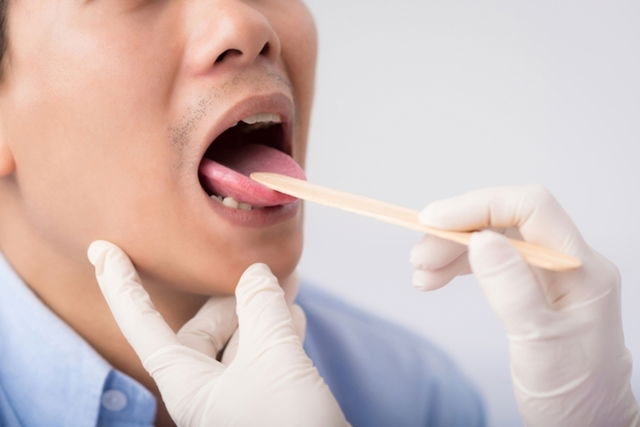Drooling can occur as a result of certain medications, or from exposure to toxins. It is a common symptoms of many different health conditions that are generally easy to treat, like an infection, cavity, or acid reflux. Once the underlying condition is addressed, the drooling typically resolves.
Excessive drooling, however, can be a sign of a chronic disease, like Parkinson’s, down syndrome or lateral amyotryphic sclerosis.
Specific treatment aimed at reducing saliva production may be indicated by the doctor as necessary. Some treatment options include anticholinergic medication or Botox injections.

The most common causes of excessive drooling are:
1. Acid reflux
Gastroesophageal reflux disease is characterized by a back-up of stomach content into the esophagus. Common symptoms include excessive saliva production, indigestion, and burning in the stomach or mouth. Learn more about the causes and other symptoms of GERD.
What to do: Treatment of GERD consists of lifestyle changes and medications that neutralize and reduce stomach acid production. Read more about ways you can treat acid reflux naturally at home.
2. Infections
When the body is fighting an infection, you may notice that you are drooling more. This is one of the body’s ways of eliminating bacteria. The same can occur when you have a cavity, which can lead to a bacterial infection of the tooth.
What to do: Treatment depends on the location and severity of the infection, as well as the microorganism causing infection. The doctor may prescribe antibiotics if appropriate. In the meantime, you should increase your fluid intake and maintain a balanced diet.
3. Medication use
The use of certain medications, like tranquilizers and anticonvulsant, can trigger increased saliva production. Exposure to certain toxins, like mercury, can also lead to this symptom.
What to do: You should speak to your prescriber about the drooling side effect and discuss the possibility of switching to another medication. If you suspect you have been exposed to a harmful toxin, you should call your local poison control center or proceed immediately to the hospital.
4. Pregnancy
During pregnancy, some women may notice more drooling. This may be related to the nausea or vomiting that occur due to hormonal changes.
What to do: Increased saliva production is normal during pregnancy and does not require intervention. However, if it is associated with nausea and vomiting, you can try drinking ginger and lemon tea. If you are very uncomfortable, you are advised to follow up with your OBGYN for more effective treatment. Check out ways you can treat nausea naturally during pregnancy.
5. Under or overbite
An underbite or overbite refers to the misalignment of the top teeth to the bottom teeth. Severe protrusion of the top or bottom teeth can cause symptoms like tooth breakdown, difficulty moving the jaw, tooth loss, headache and increased drooling.
What to do: The treatment for underbites or overbites depends on their severity. A dentist my recommend braces, the removal of one or more teeth, and in some cases, surgery.
6. Parkinson’s disease
Parkinson’s disease is a degenerative illness in the pain that affects movement. It causes tremors, muscle stiffness, and slow or clumsy movements. These symptoms start off gradually and are nearly unnoticeable, but worsen with time. Some patients will additionally develop decreased facial expressions, difficulty speaking and swallowing, and changes to salivation.
What to do: Generally, treatment for Parkinson’s involves lifelong medications. These medications help to lessen symptoms and delay disease progression.
In addition, excess drooling can also be a symptom of other neurological conditions, like cerebral paralysis, facial paralysis, stroke, Down’s syndrome, lateral amyotrophic sclerosis or autism.
When to go to the doctor
You should be assessed by a doctor if you have drooling with any of the following symptoms:
- Fever
- Difficulty swallowing or moving food around in your mouth
- Confusion, drowsiness or agitation
- Seizures
- Tremors in parts of the body
- Nausea and vomiting
- Difficulty breathing
- Diarrhea
In these cases, excessive salivating may be associated wuth more serious causes, such as poisoning, infection or a neurological diseases, such as cerebral palsy or Parkinson's disease. These should be diagnosed so that treatment can be started promptly.
